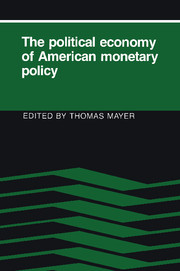Book contents
- Frontmatter
- Contents
- Preface
- List of contributors
- 1 Introduction
- 2 Studying the Fed: toward a broader public-choice perspective
- 3 The Federal Reserve reaction function: a specification search
- 4 Corporate profitability as a determinant of restrictive monetary policy: estimates for the postwar United States
- 5 Federal Reserve behavior since 1980: a financial-market perspective
- 6 The Federal Reserve and its institutional environment: a review
- 7 The political economy of monetary policy
- 8 Political monetary cycles
- 9 Congress and the Fed: why the dog does not bark in the night
- 10 The Federal Reserve as a political power
- 11 Monetary policy and political economy: the Federal Reserve and the Bank of Japan
- 12 A positive analysis of the policy-making process at the Federal Reserve
- 13 A theory of FOMC dissent voting with evidence from the time series
- 14 Explaining FOMC members' votes
- 15 Fed behavior and X-efficiency theory: toward a general framework
- 16 Minimizing regret: cognitive dissonance as an explanation of FOMC behavior
- 17 The discount window
- 18 Leaning against the wind: the behavior of the money stock in recession and recovery, 1953–8
- 19 Bureaucratic self-interest as an obstacle to monetary reform
- Index
Preface
Published online by Cambridge University Press: 06 July 2010
- Frontmatter
- Contents
- Preface
- List of contributors
- 1 Introduction
- 2 Studying the Fed: toward a broader public-choice perspective
- 3 The Federal Reserve reaction function: a specification search
- 4 Corporate profitability as a determinant of restrictive monetary policy: estimates for the postwar United States
- 5 Federal Reserve behavior since 1980: a financial-market perspective
- 6 The Federal Reserve and its institutional environment: a review
- 7 The political economy of monetary policy
- 8 Political monetary cycles
- 9 Congress and the Fed: why the dog does not bark in the night
- 10 The Federal Reserve as a political power
- 11 Monetary policy and political economy: the Federal Reserve and the Bank of Japan
- 12 A positive analysis of the policy-making process at the Federal Reserve
- 13 A theory of FOMC dissent voting with evidence from the time series
- 14 Explaining FOMC members' votes
- 15 Fed behavior and X-efficiency theory: toward a general framework
- 16 Minimizing regret: cognitive dissonance as an explanation of FOMC behavior
- 17 The discount window
- 18 Leaning against the wind: the behavior of the money stock in recession and recovery, 1953–8
- 19 Bureaucratic self-interest as an obstacle to monetary reform
- Index
Summary
There is much dispute about the efficacy of countercyclical monetary policy. In part this is due to disagreements about economic theory, or about the size of certain parameters. But much of it reflects different assumptions about the extent to which political pressures prevent the Fed from following appropriate policies, the degree to which its policies are influenced by its own bureaucratic interests, and the efficiency with which it makes policy. Hence, I invited a number of economists and political scientists, most of whom have worked on these problems, to write chapters for a volume dealing with Fed behavior. The resulting chapters cover many aspects of Fed policy, such as its actual independence, its devotion to the public interest, and biases and inefficiencies in its policy-making.
The picture that emerges in these chapters differs sharply from the traditional “textbook” view, which has monetary policy being made by an independent central bank, totally devoted to the public interest, using the most sophisticated tools of economic analysis. In that textbook view, it is only a lack of certain information, such as the absence of reliable forecasts, that constrains the Fed's policy-making. The chapters in this volume show how implausible that textbook view is. Yet this book is not just another exercise in Fed-bashing. It is not the Fed's fault that its actual independence is sharply circumscribed. Nor is the Fed the only organization whose policy-making is influenced by self-interest, by biases, and by cognitive difficulties. I suspect that the Fed has a much better record than do most other government agencies, or the universities, for that matter.
- Type
- Chapter
- Information
- The Political Economy of American Monetary Policy , pp. vii - viiiPublisher: Cambridge University PressPrint publication year: 1990

